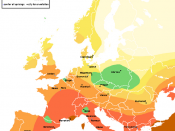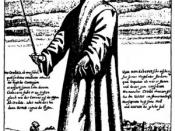Black Death
The most fierce and widespread epidemic was the outbreak of the bubonic plague. It ravaged Europe between 1347 and 1353 killing 25 million people, approximately one-third of the population. Such a vast amount of people died that it took the following two centuries to regain Europe's original population. I am going to inform you how this unyielding plague had tremendous affects on Europe. The bubonic plague began in China and quickly spread through Asia to the Mediterranean Sea and took its toll on surrounding countries. Europe had many towns with substantial populations. These towns wre unsanitary because garbage and sewage were tossed into the streets. The conditions were perfect for the spread of diseases and most likely contributed to epidemic of the bubonic plague. During this time period, it was beyond one's powers to discover, understand, or explain this ruthless plague. What ever the causes may be, the most common reaction to the plague was fear.
People fled from the wretched disease and each other. Families split apart and friends deserted each other. People lost faith in the church for many reasons. One reson was there were not any priests, bishops, or popes to lead them. They too were dying of the bubonic plague. The people were not even allowed to attend services or gather in large groups for fear of spreading the disease. The plague even change the way people thought about God. Some even believed the plague was God's punishment. Europe's entire economic and political systems had collapsed for a time. Trade and business closed their doors. To make matters worse, the city councils were demolished and whole families of local nobles wre wiped out. Courts closed down and wills could not be probated. IT the eoidemic would not have beset Europe, things would have been...


